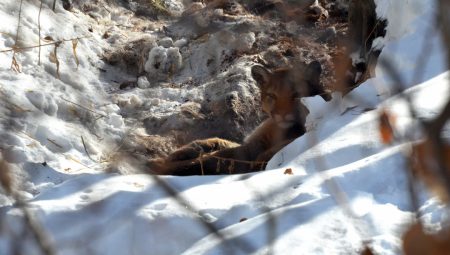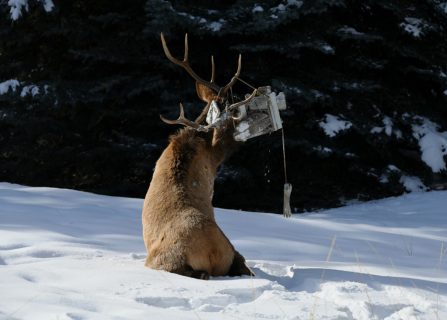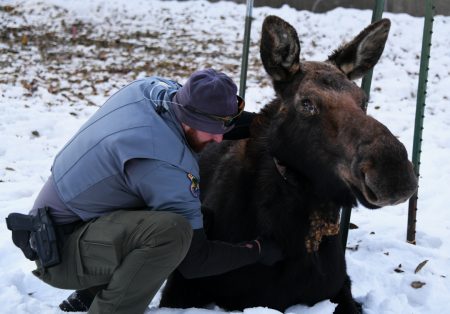Idaho’s black bears will soon be emerging from their winter dens
By Terry Thompson, Regional Communications Manager
Monday, April 20, 2020 – 2:03 PM MDT
As black bears emerge from their winter hibernation, they will immediately begin to forage for food to replenish their fat reserves. It is everyone’s responsibility to keep bears wild, and not finding food rewards from household or business garbage cans.
It appears that we are well on our way towards spring. With plants starting to break their long winter dormancy, wildlife will soon be doing the same. Black bears that live in south-central Idaho and other parts of the state are waking up, and they will be very hungry.
After spending the winter months burning their fat reserves hibernating, black bears will immediately start looking for food, mostly spring grasses, but pretty much anything that can provide easy calories. During hibernation, boars (male) black bears usually lose 15-30% of their body weight, while sows with cubs can lose up to 40%. After emerging from hibernation, black bears are on a quest to eat between 15,000 – 20,000 calories a day to build up their fat reserves, which means they are constantly searching for food.
Bears can smell food for miles
After leaving their winter dens, bears begin to search out food sources by using their extremely keen sense of smell. In fact, it is believed that a bear’s sense of smell is seven times better than a bloodhound’s, and is often measured in miles.
That sense of smell is a great benefit for a bear. Being omnivores, meaning they eat both plants and meat, bears will eat anything they can find. And with the nose talent of a bear they will find just about anything. This can also be a great problem for a bear and for managers of wildlife. Using their amazing sense of smell, bears might be attracted to your neighborhood looking for a food reward which too often is that leftover food now fermenting in your garbage can. It’s not too early for all Wood River Valley and other Idaho residents to do your part to ensure that bears, as well as all wildlife, do not find a food reward around your house.
There’s a community opportunity for the Wood River Valley.
We all know it never ends well for the bear who becomes habituated to human food. We’ve all heard the saying “a fed bear is a dead bear” which is an unfortunate reality.
Public safety will always be the priority when bears find food rewards, leading them to become habituated to food found around houses and businesses.
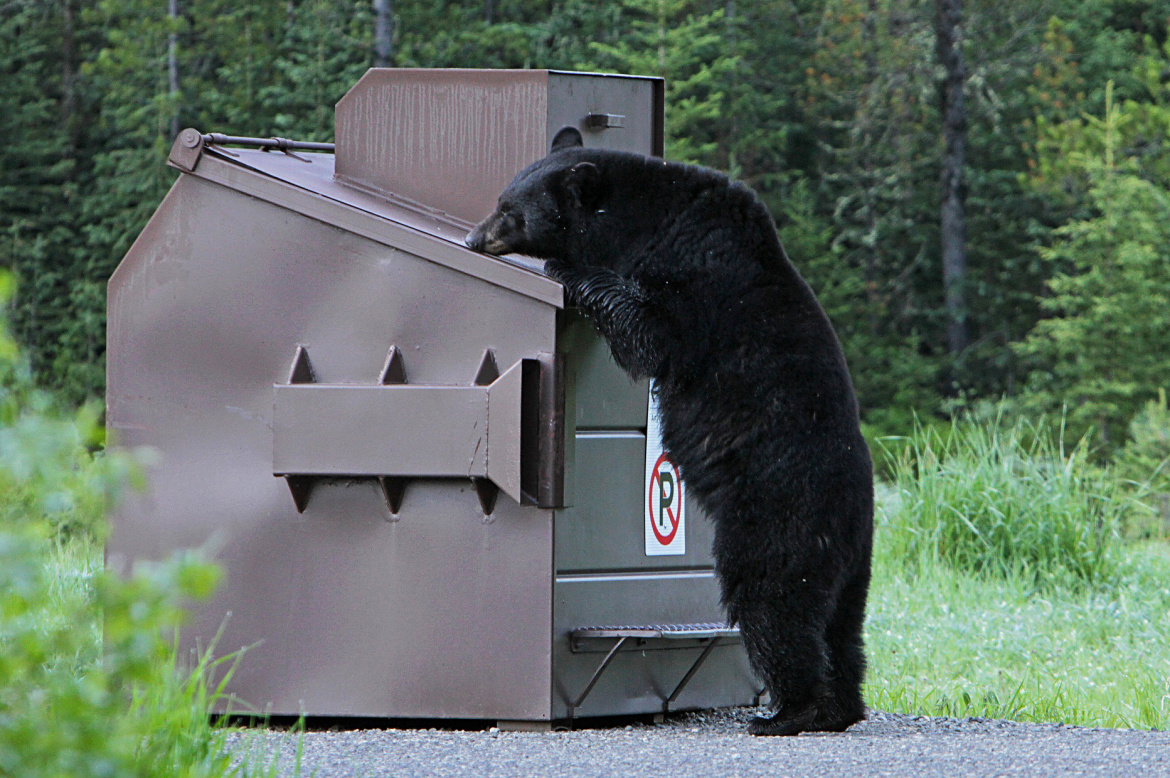
A black bear checks out a bear-resistant garbage dumpster.
Every resident, and even our seasonal visitors needs to pledge to eliminate all chances for bears to get human food, ever!
Wood River Valley residents, as well as other Idahoans, pride themselves on living in close proximity to wildlife. However, that also means everyone shares the responsibility to keep wildlife wild. Allowing bears to become comfortable living in your neighborhood could be a death sentence – for the bear. While a bear in your yard might be exciting, you must do your part to keep the bear wild.
It’s everyone’s responsibility to make sure that bears know that they don’t belong in neighborhoods.
When a bear learns that walking across your yard or deck is OK, it will continue that behavior. By doing nothing, the bear learns that people are harmless and that making daily walks around your house is both acceptable and potentially rewarding if they find food.
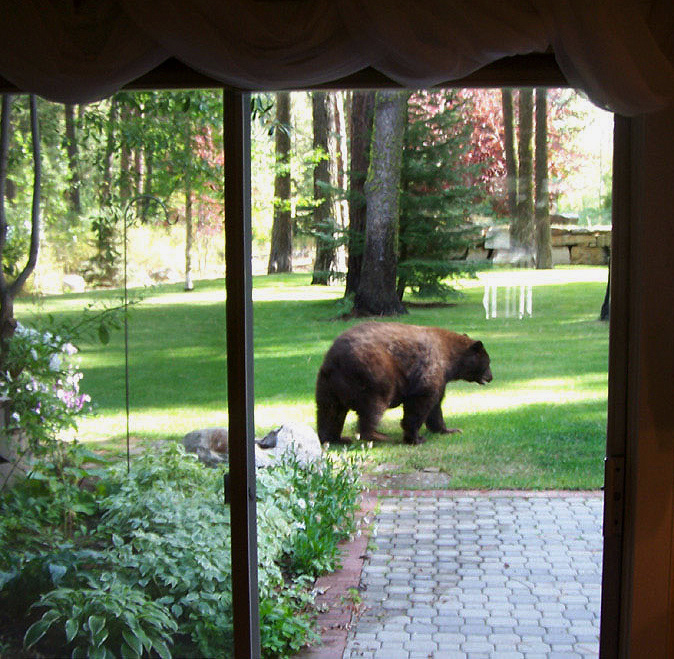
A black bear walks through a backyard
If you have a bear around your house, or in your neighborhood, and, if it can be done safely, immediate action is necessary to haze the bear to let it know it is not welcome. This can be done by loud yelling, clapping your hands, banging on pots and pans, basically anything to scare it away.
Bears are very smart. They can learn quickly where they are not welcome. Hazing can be a very effective tool to keep bears out of communities and neighborhoods and in doing so, you will help preserve the wild nature of bears that is essential for their survival.
Please don’t wait to manage your garbage until it’s too late.
The safety of Wood River Valley residents, visitors and all Idahoans will always be the primary concern for Fish and Game. A bear that has developed a repeated habit of searching out and acquiring food from human sources is a threat to public safety, and will be trapped or darted with an anesthetizing drug, and then euthanized.
Relocation of a food habituated bear is not an option.
Often, the bear returns to where it was trapped because it knows there is a food reward waiting for them. Moving this bear might also just transfer the problem to another community or campground in the backcountry.
Do your part to keep yourself, your neighbors and the bears of the Wood River Valley safe.
There are very simple things everyone can do to keep everyone safe and bears roaming the mountains where they belong.
- Where possible, use a bear resistant garbage container.
- Don’t put your garbage out until the morning of pickup, and until then, keep your garbage in a secure location, like a garage.
- Birds don’t actually need bird feeders to survive during the summer months because of an abundance of natural food sources, and residents are encouraged to take them down during this time. Bears can get a tremendous amount of calories from bird feeders, such as a 2,500 calorie reward from one pound of black oil sunflower seed, or 3,200 calorie reward from 32 ounces of hummingbird food.
- Don’t leave pet or livestock food outside where a bear can find it.
- Put an electric fence wire around chicken coops and bee hives.
It’s up to everyone to keep our communities safe, while keeping bears, and all wildlife, wild!
For more information, please contact the Magic Valley Regional Office at (208) 324-4359 or your nearest Idaho Department of Fish and Game office.


